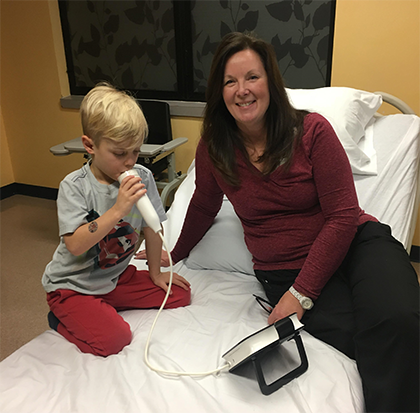
Research plays a vital role in ensuring patients get the best medical care possible and respiratory therapists can add significant value to research projects that delve into aspects of cardiopulmonary care. Julie Burmester, RRT, is a clinical research coordinator in the Kosair Charities Pediatric Clinical Research Unit in Louisville, KY, and in this interview, she explains how and why she got involved in the area and what it means to her to play a role in adding to the scientific evidence —
How long have you been an RT and what drew you to the field?
While in college, I was drawn to the medical field, but was not sure I wanted to be a nurse. I spoke with an advisor, who suggested applying to the respiratory therapy program, which I did. I graduated from the University of Louisville in 1986, with an associate’s degree in respiratory therapy. I have been a registered respiratory therapist for 32 years.
When, where, and how did you first become involved in respiratory care research and what piqued your interest in conducting studies on RC topics?
I worked in a pediatric pulmonary office for 20 years. I was hired as a study coordinator/staff respiratory therapist, and my first study was “The Epidemiological Study of Cystic Fibrosis.” This was a data collection study, sponsored by the makers of Pulmozyme. This study helped to generate more studies to further research in the treatment of cystic fibrosis. The pulmonologists I worked with were heavily involved in research. I moved from data collection studies to drug trials involving subjects with cystic fibrosis and asthma.
When and how did you get the job as a clinical research coordinator in the Pediatric Clinical Research Unit and what did you need to do to qualify for it?
I joined the Pediatric Clinical Research Unit 2.5 years ago. I had a friend that worked in the research unit; she told me there were open positions and I applied. My 14 years working in the children’s hospital and 20 years of experience with research in the pulmonology office, my certifications, and my willingness to learn helped me land my current position.
What does the role entail?
Research requires ongoing, consistent communication with physicians, the study team, research subjects, and their parents. A research subject can appear at any moment; therefore, you have to be flexible and ready to enroll. Research has definitely made me pay more attention to detail and has made me more organized.
Can you give me an example or two of the types of studies you have worked on in this role and what it has meant to you to be able to contribute to this research?
I am the primary coordinator on a synthetic surfactant study for neonates 24 weeks to 29 weeks gestational age. This surfactant study is very necessary for decreasing the possibility of infection or inflammation that may come from animal-derived surfactant. Also, synthetic surfactant is an alternative for people that don’t ingest animal products due to dietary restrictions or religious beliefs.
I am also coordinating a long-term bronchiolitis study for children that were hospitalized before one year of age with bronchiolitis. This study follows children through 10 years of age, in hopes of identifying which children will go on to develop wheezing and eventually asthma.
Do you think other RTs could take on a research role such as the one you have? If so, what advice do you have for them in regard to making it happen?
Research is a cornerstone of health care and very necessary for advancements in health care. Respiratory therapists can be very helpful with their knowledge of pulmonary function testing, inhaled medication and delivery devices, ventilators, and oxygen therapy.
I encourage respiratory therapists to take part in research, wherever possible. Respiratory therapy is forever changing and evolving as a result of research. I am very proud to be able to say that this past October, I passed the Certified Clinical Research Coordinator (CCRC) exam and I am now a certified research coordinator.





